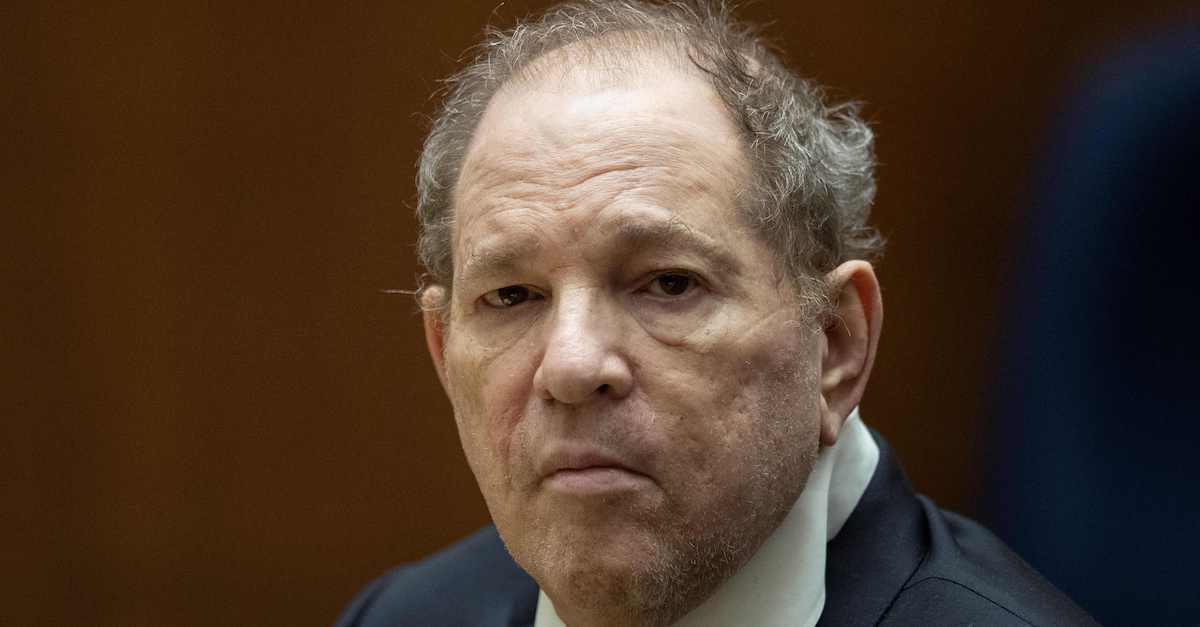
Former film producer Harvey Weinstein appears in court at the Clara Shortridge Foltz Criminal Justice Center in Los Angeles on Oct. 4, 2022. (Photo by ETIENNE LAURENT / POOL / AFP.)
Disgraced movie producer and convicted rapist Harvey Weinstein will only hear a victim impact statement from one of the many women he preyed on when he is sentenced in a downtown Los Angeles courtroom next week, the judge overseeing his case ruled Thursday.
An attorney for many of those alleged victims says the decision may have violated the California Constitution and statutory law.
In an interview with Law&Crime, famed attorney Gloria Allred noted that the Golden State is one of just a few jurisdictions where victims’ rights are enshrined in the state constitution.
While accepting her clients’ briefs for filing, Judge Lisa B. Lench ruled that two women who wished to speak – Jane Doe 2 and Jane Doe 4 – might taint a potential jury pool if allowed to give victim impact statements because prosecutors could or will in the future, retry Weinstein on their allegations.
“As it now stands there is an open case with respect to Jane Doe 2 and Jane Doe 4,” the judge said. “I think it would be wholly inappropriate for me to consider what they have to say when there is still a case pending when it comes to Mr. Weinstein’s sentence for the reason that right now with respect to Jane Doe 2 and Jane Doe 4, he is presumed to be innocent.”
Los Angeles County jurors previously deadlocked on the allegations made by Does 2 and 4, voting 10-2 and 8-4 on various sex crimes charges in favor of conviction.
Weinstein is scheduled to be sentenced on Feb. 23 for one count each of forced oral copulation, forcible rape, and penetration with a foreign object. Each of those charges stemmed from the February 2013 sexual assault of Jane Doe 1, a Russian-Italian model who Weinstein attacked at Mr. C’s hotel in Beverly Hills after she returned to her room following a day at the LA Italia Film Festival.
Thursday’s ruling upholds the court’s previous ruling from early January that only Doe 1 would be allowed to give testimony during the upcoming sentencing hearing.
Two additional women, Jane Doe 5 and Natassia Malthe, a pattern witness, colloquially called “MeToo witnesses,” Lerner ruled, would not have qualified for the hearing.
“With respect to Jane Doe 5 and any [pattern witnesses], they are not right now people who have an issue that is to be considered at the time of sentencing,” the judge said during the hearing. “The [pattern witnesses] are not victims of crimes in California and the charges with respect to Jane Doe 5 have been dismissed.”
Jane Doe 5 testified before a Los Angeles County grand jury, resulting in the filing of charges against Weinstein, but ultimately those specific charges were dismissed after she did not testify at the most recent trial.
“I don’t think it’s appropriate for the court to consider the issues with respect to those alleged victims when it comes time to select the appropriate sentence for Mr. Weinstein,” Lerner went on – saying she was limited by statute. “I do not believe that what those individuals have to say is germane [to the court] when it comes to the appropriate sentence. So, I’m not going to make this an open forum on Mr. Weinstein’s conduct.”
Allred insisted the testimony was “more probative than prejudicial” and stressed that there was the “possibility of an unjust sentence without the court hearing from all of [Weinstein’s] victims.”
During the hearing, Allred argued that under the standards of California’s Marsy’s Law, all three of her clients qualified as victims and should be allowed to provide victim impact statements.
“I believe this is a matter of right,” she said. “They have a right to speak.”
Allred noted that two of her clients were specifically referred to as victims by prosecutors in the past.
“They have a right to give a victim impact statement at the time of sentencing,” she stressed to the court.
Lerner, however, was unmoved.
“I’m not going to allow anybody other than Jane Doe 1 to make a victim impact statement,” the judge ruled.
Allred said she might file a writ to contest the court’s bench ruling but accepted that there was not much time to do so.
Weinstein is serving a 23-year sentence after being convicted on two sex crime charges in New York City in 2020, years after accusations against him first went public and launched the #MeToo Movement. Weinstein faces up to 18 years in prison on the charges related to the three crimes against Jane Doe 1.